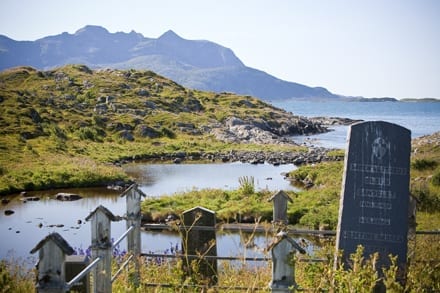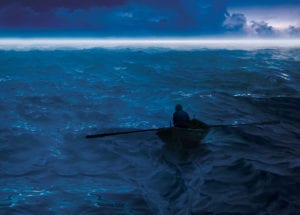By Daniel de la Calle
Hello Everybody,
My name is Daniel de la Calle and I was the production photographer in “A Sea Change”. Barbara Ettinger and Sven Huseby recently asked me to continue collaborating by working on the website, so I hope to write some posts over these upcoming months.
Today I was feeling at first like an old locomotive, struggling to make the first inches of a journey, consumed by inertia*, until I came up with the idea of writing about one of the locations and moments I remember the most from the whole production:
We were on a boat north of Tromsø (Norway), heading with Rolf Seljelid to a miniscule island in a fjord, out to interview him at a property he has nearby, and were stopping there to get some beauty shots. While docking on the pier he told us that speck of land only contained a church and a graveyard with some of the tombstones disseminated outside the initial burial grounds, almost touching the shore. Pointing in the direction of the lonely, modest white building he added: “Sven, when you look at the names and dates on the graves you will notice that practically all of them are of women and children; almost no men were buried on the island. That’s because every man here was a fisherman and many of them either fell overboard in rough weather, or their boats sank or had some other calamity happen while at sea. These waters are so cold that in less than five minutes the body paralyzes and falling overboard meant certain death. So most times there were no corpses to bury, they were never found.”
During that afternoon he continued talking about his people, the Sami, and the importance of fishing, how it allowed them not just to survive in that harsh environment, but to never have known a famine in recorded history. All thanks to that quasi frozen sea.
Those words resonated in me. Up until the introduction of potatoes from Peru and Bolivia Europe underwent countless famines. The fact that the last one was actually due to them, or more precisely to the monoculture of one particular variety, is anecdotic: potatoes radically changed life in central and northern Europe. Anyway, it was extraordinary to be there, in such an isolated, rough and extreme place, looking at it under that new light, it felt paradoxical and beautiful. Which seamlessly leads to my conclusion and to a strange demand: we should demand the right of future generations to still find abundant fish in arctic waters and the right to die in a semi frozen ocean if they should fall overboard, because one comes with the other and that that is, is.

*I find interesting that the word “inertia” has the same definition in English and Spanish: “a property of matter by which it continues in its existing state of rest or uniform motion in a straight line…” , but while we almost exclusively use it to talk about objects in motion, in English it is referred to static objects.


